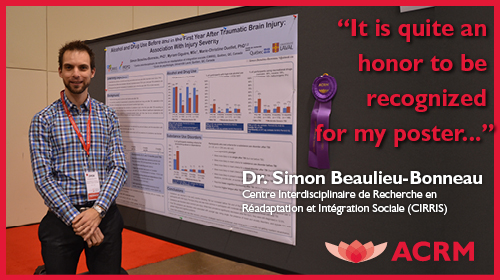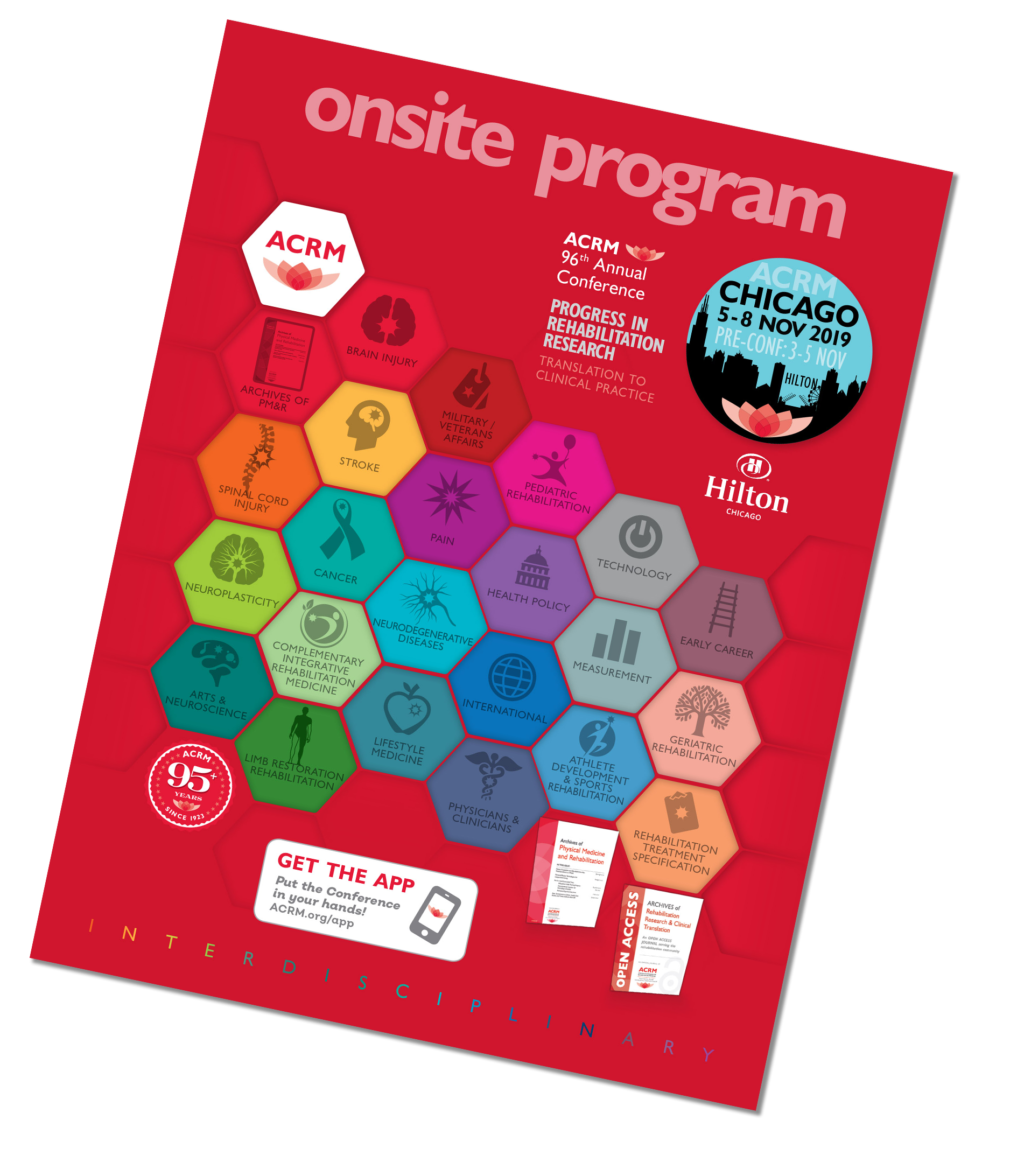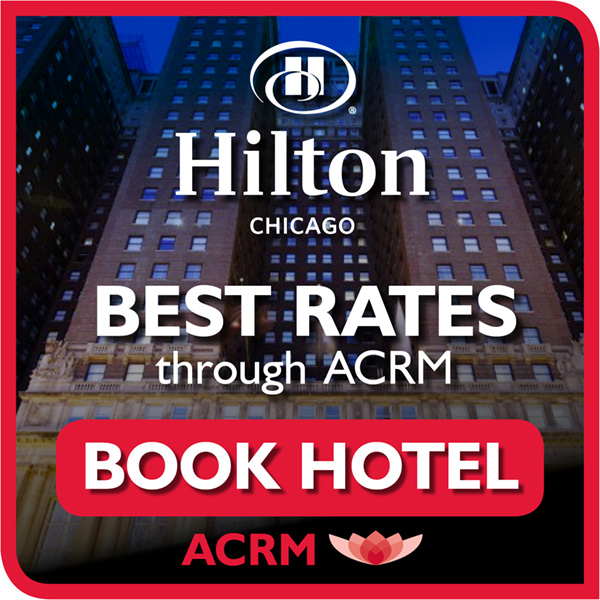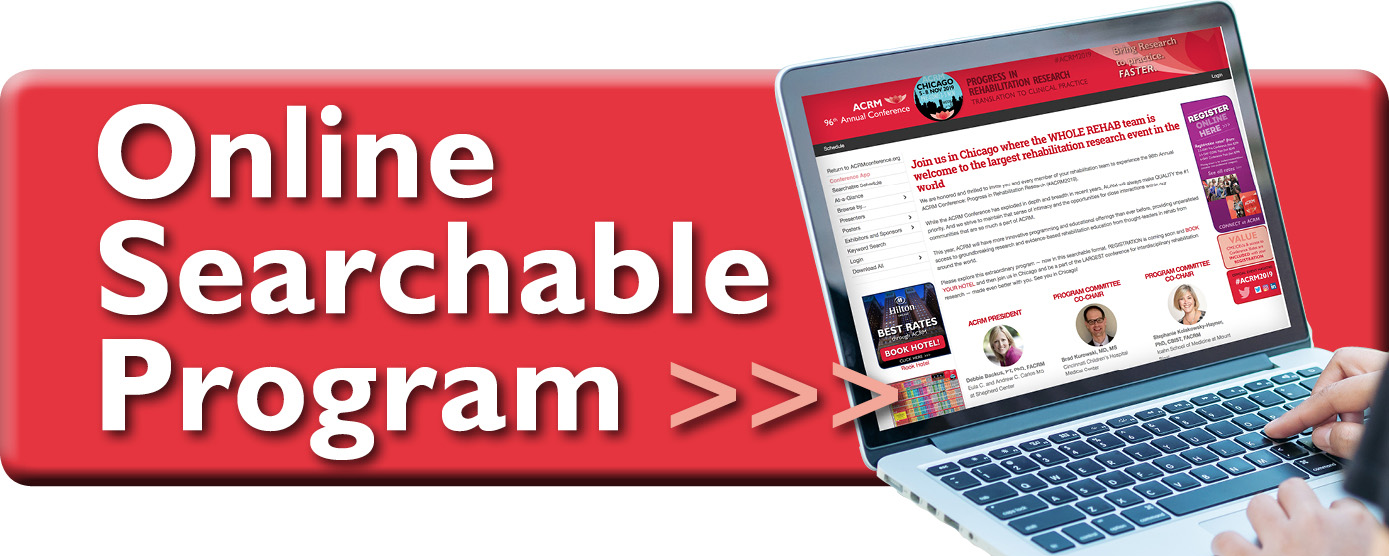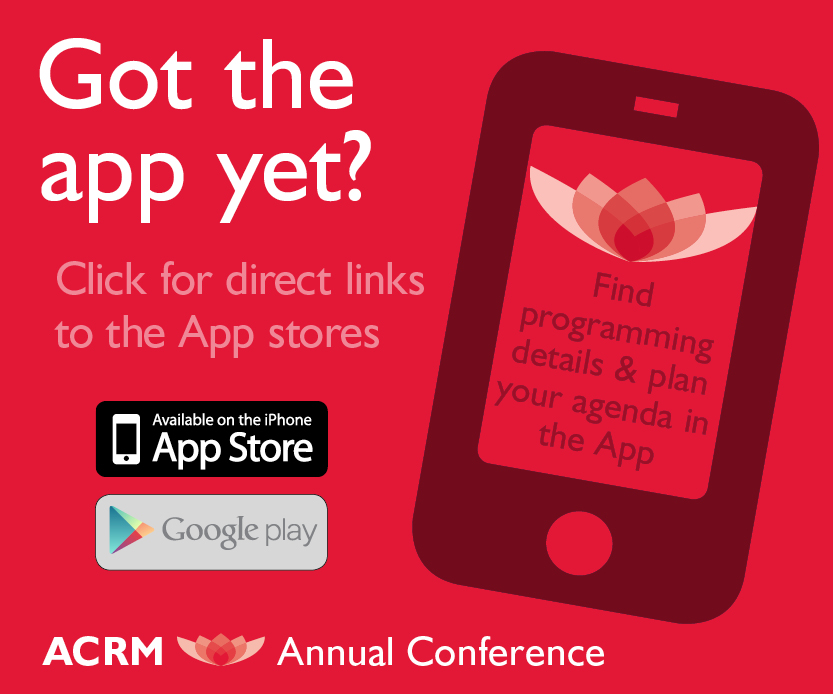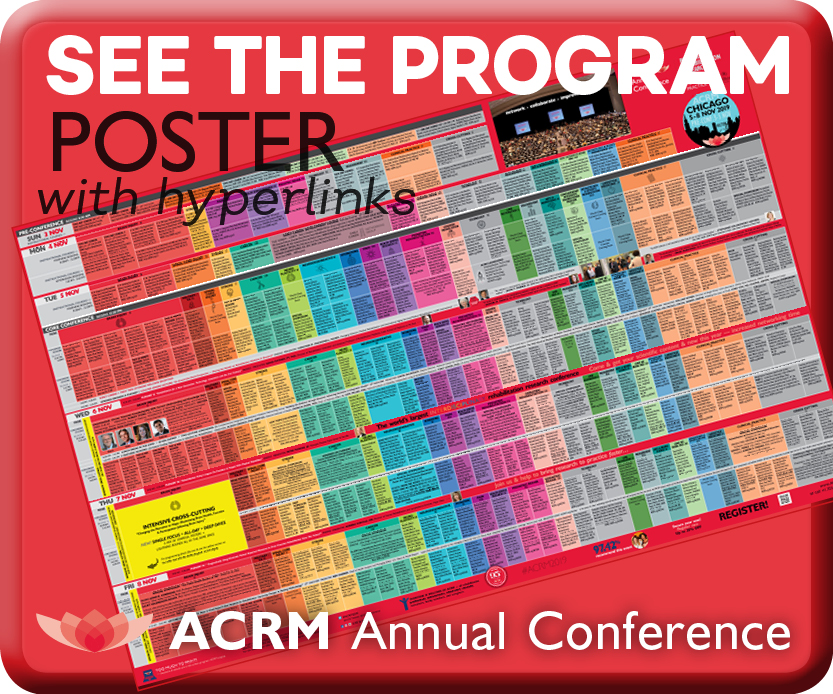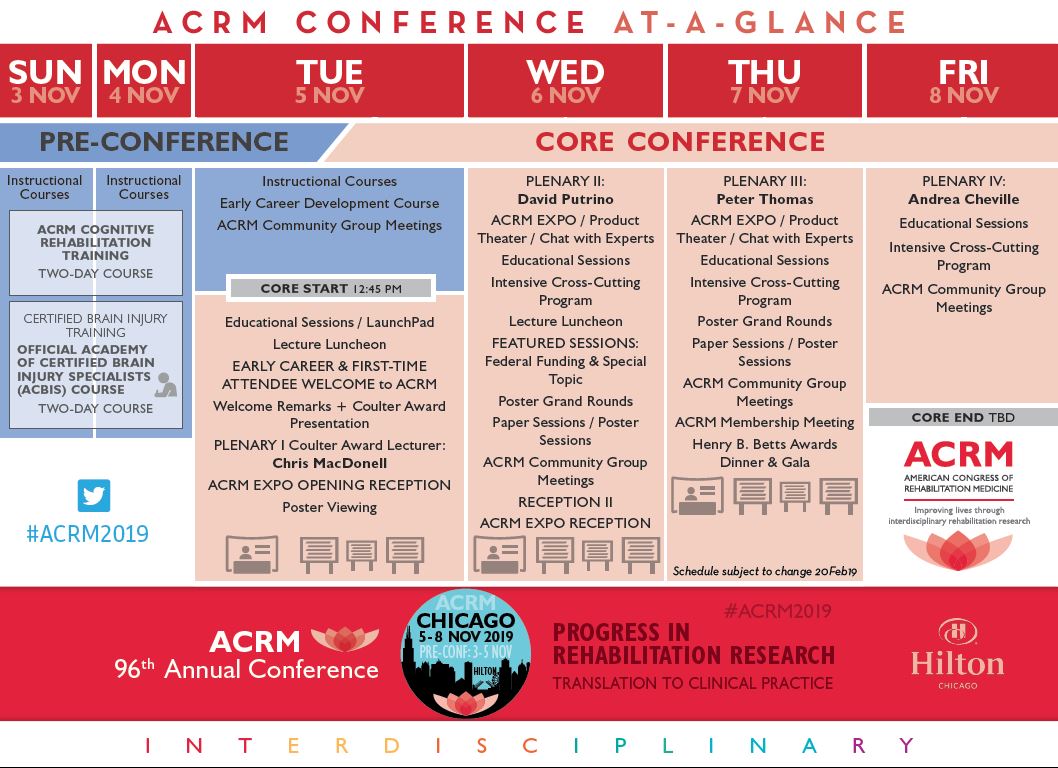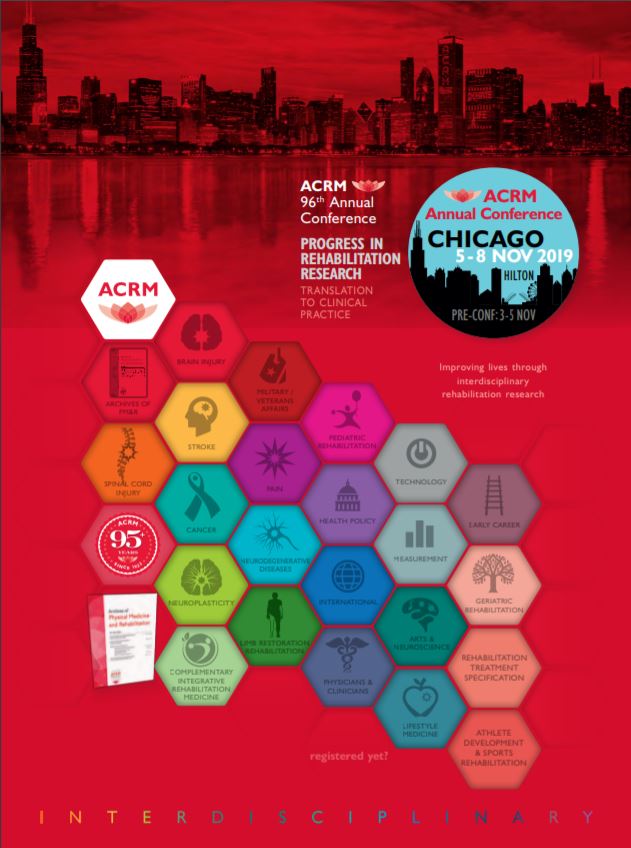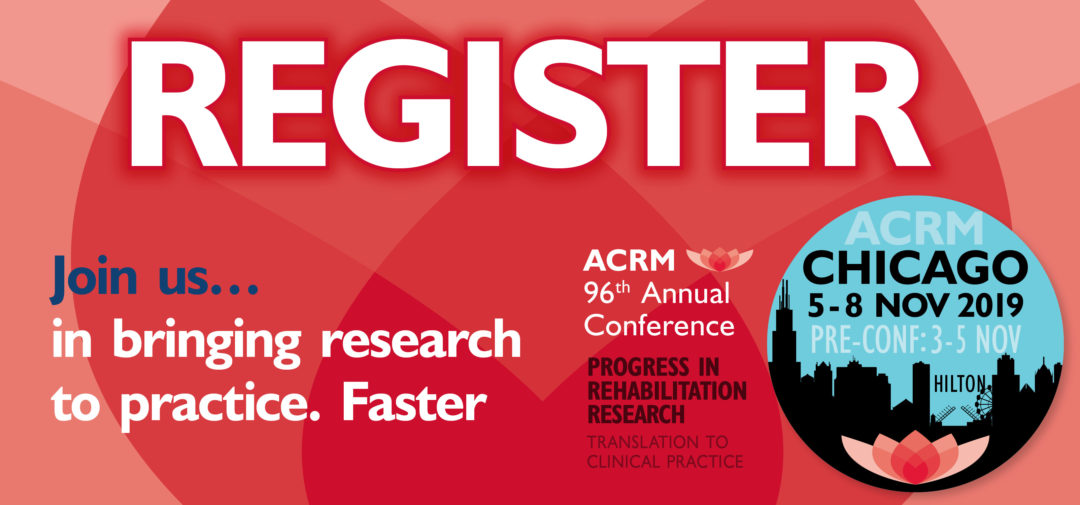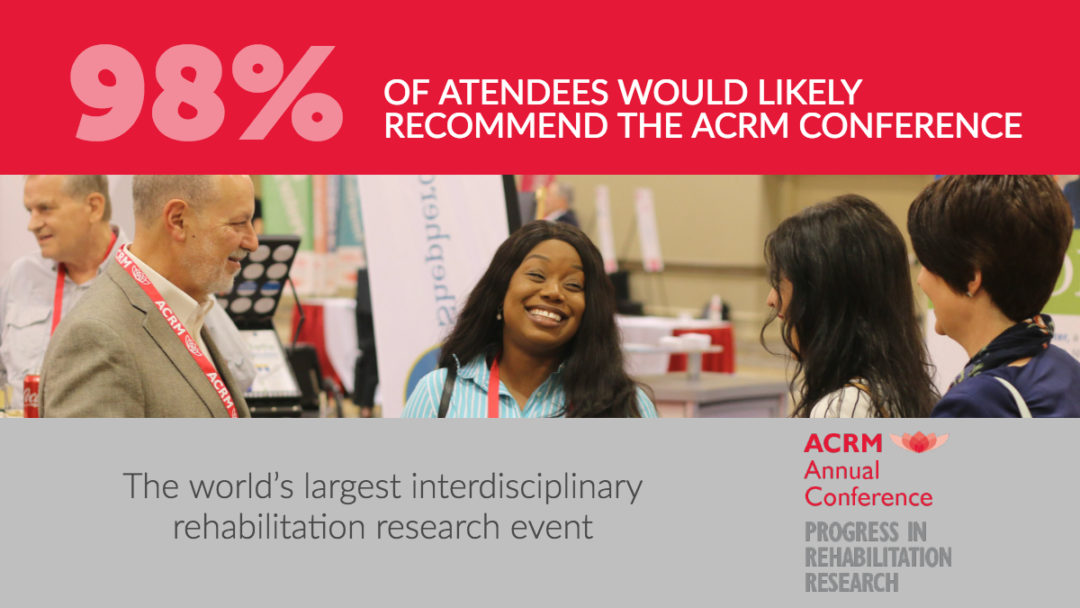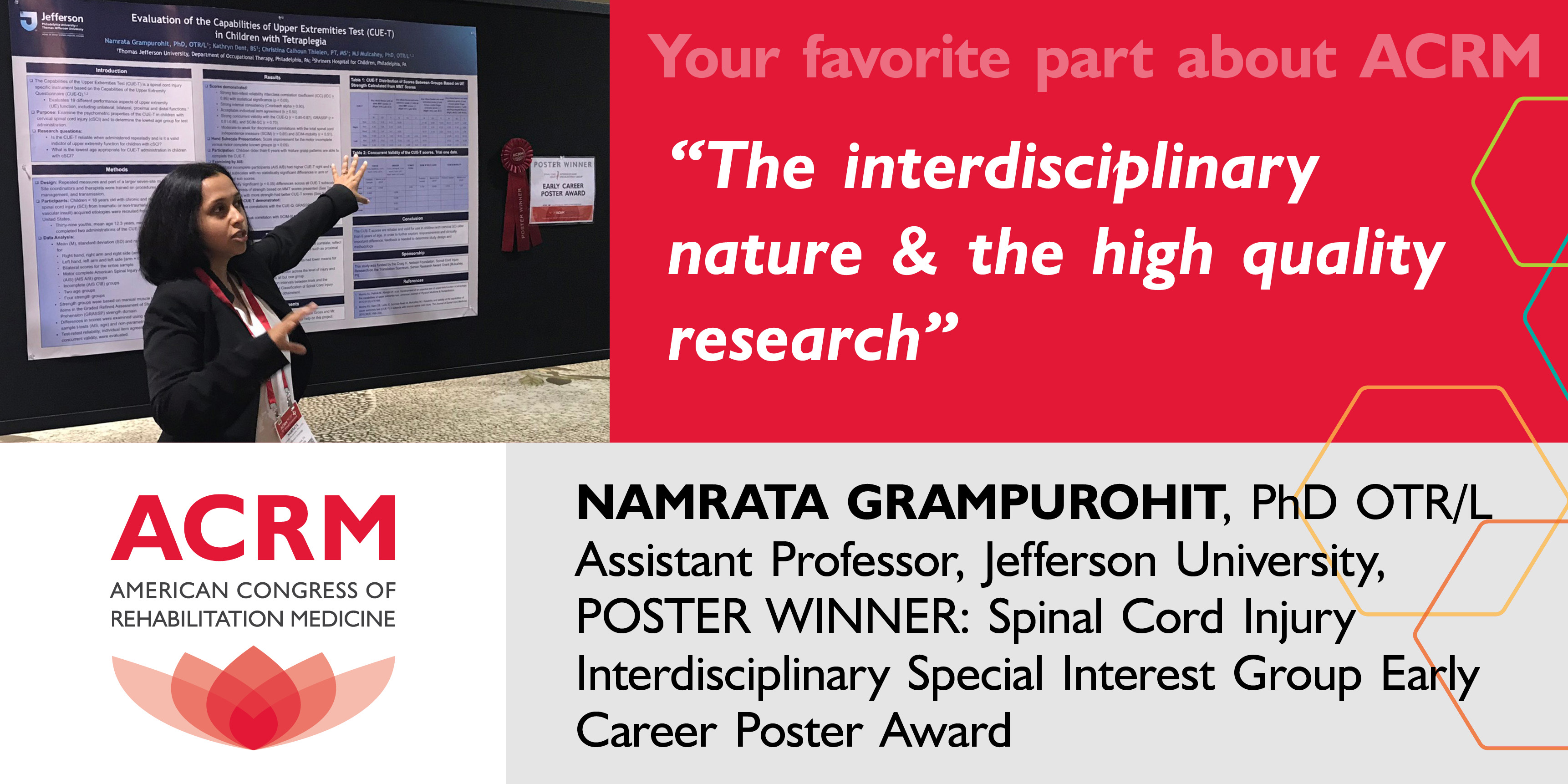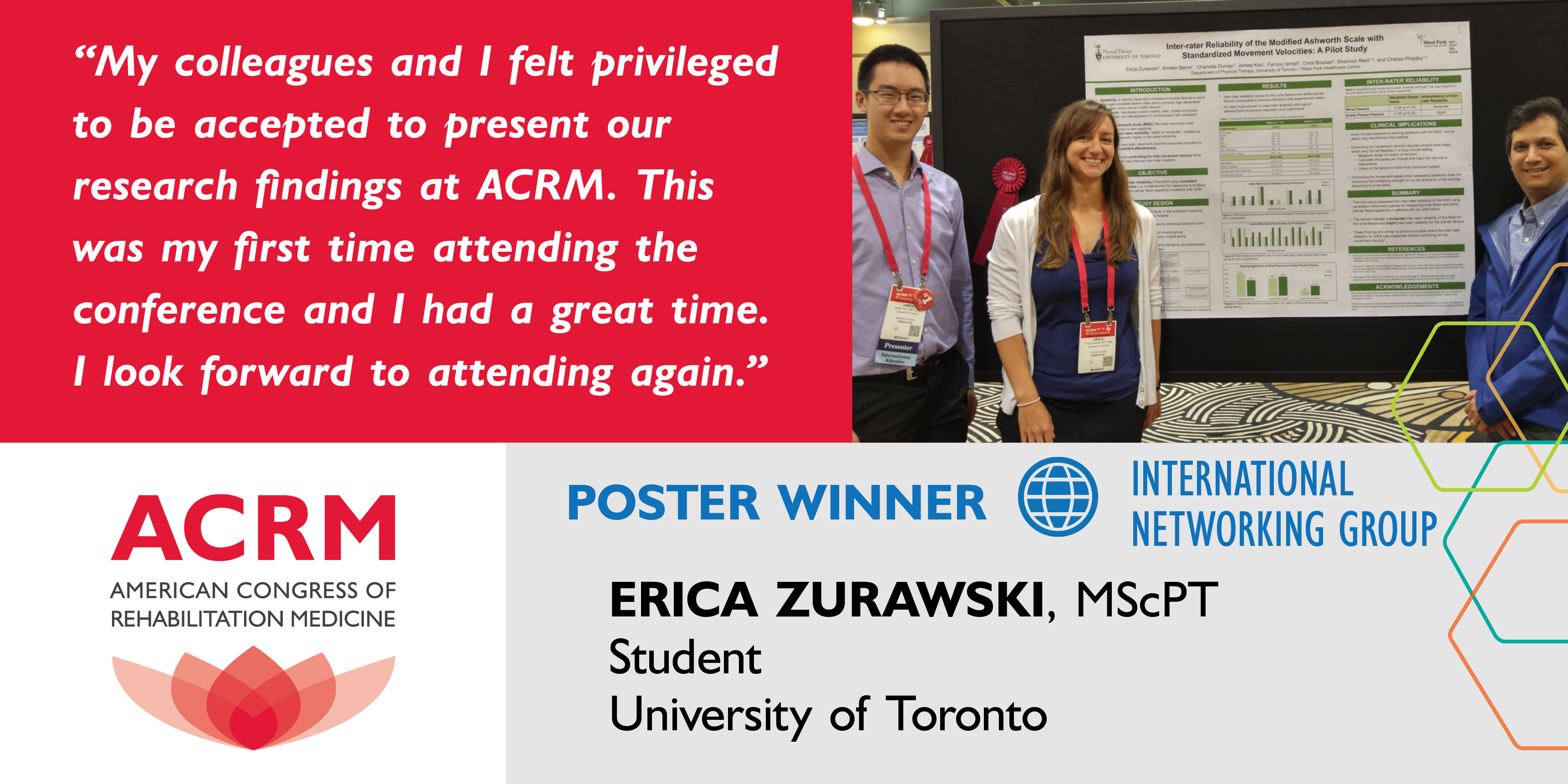CALL FOR LATE-BREAKING RESEARCH
EXTENDED through 6 AUG 2019 FINAL DEADLINE
GO TO THE ONLINE SUBMISSION SYSTEM >>
There is still time to participate in the 2019 ACRM Annual Conference in Chicago. The ACRM Program Committee will be accepting proposals to present your latest research as a scientific poster.
Present your research to an interprofessional audience. Be a part of the largest interdisciplinary rehab research event.
CONFERENCE INFO
CORE Conference: 5 – 8 NOV // Pre-Conference: 3 – 5 NOV
LOCATION: Hilton Chicago // Chicago IL USA
WHY SUBMIT?
- BUILD YOUR CV
-
Participating in the ACRM Annual Conference and being published in the ARCHIVES are celebration-worthy career milestones
-
- PRESENT your research / your knowledge to a large INTERNATIONAL audience
-
3000+ attendees from 60+ countries expected
-
- CONNECT with interdisciplinary colleagues who share your research interests and passions
- NETWORK with POTENTIAL EMPLOYERS, mentors, collaborators, and funders
- Gain RECOGNITION as an expert in your topic of research and as an ACRM contributor
- Get Published in the ARCHIVES
ACRM’s scientific journal, Archives of Physical Medicine and Rehabilitation (ARCHIVES) is the most-cited journal in rehabilitation. All accepted abstracts will be published, fully searchable and citable, in the online pages of ARCHIVES.
-
AWARDS — Become eligible for prestigious ACRM AWARDS for outstanding posters
-
DISCOVER: …interprofessional colleagues… The ACRM Conference attracts the most passionate interdisciplinary mix of rehabilitation pros from around the world
WHO SHOULD SUBMIT?
Rehabilitation professionals or teams who:
- Wish to present their latest research
- Value the opportunity to engage with an interdisciplinary audience
- Offer translational research to inform evidence-based practice
- Include early career and/or international speakers
- Wish to present topics with an interdisciplinary focus
HOW TO SUBMIT
All proposals/abstracts must be submitted online via the ACRM Annual Conference System according to the submission deadlines. To see an outline of the information you will need to enter during the submission process, please download the Proposal Worksheets.
CONFERENCE DATES & LOCATION
Pre-Conference Program: 3 – 5 NOV 2019
(Instructional Courses, Cognitive Rehabilitation Training, ACBIS Training)
Core Conference: 5 – 8 NOV 2019
(Symposia, Scientific Papers & Posters)
Location: Hilton Chicago, 720 S Michigan Ave, Chicago, IL 60605 USA
PROPOSAL SUBMISSION GUIDELINES
The ACRM Annual Conference: Progress in Rehabilitation Research (PIRR) is the premier educational conference for evidence-based learning in rehabilitation medicine. The 2019 Program Committee invites proposals focused on research evidence and its translation into clinical practice. ACRM is especially interested in the following content topics:
- Arts and Neuroscience
- Athlete Development & Sports Rehabilitation
- Brain Injury
- Cancer Rehabilitation
- Clinical Practice (assessment, diagnosis, treatment, knowledge translation/EBP, implementation science, program development)
- Complementary Integrative Rehabilitation Medicine
- Cross-Cutting
- Geriatric Rehabilitation
- Health Services Research
- International
- Lifestyle Medicine
- Limb Restoration Rehabilitation (including prosthetics/orthotics)
- Measurement
- Military/Veterans Affairs
- Neurodegenerative Diseases
- Neuroplasticity
- Pain
- Pediatric Rehabilitation
- Spinal Cord Injury
- Stroke
- Technology (e.g., robotics, assistive technology, mHealth)
Sample topic areas of interest to conference participants include:
- Evidence-based approaches to diagnosis, treatment, and overall care of individuals with acquired brain injury, spinal cord injury, stroke, neurodegenerative diseases, pain, and cancer
- Applications of technology in rehabilitation research and practice (prosthetics, orthotics, assistive technology, implantable devices, robotic devices)
- Evidence-based approaches for remediation of cognitive impairment, depression, post-traumatic stress disorder, sleep disturbances, and pain
- Role of exercise and “activity-based” therapy in neuro-recovery
- Use of innovative information and communications technology in rehabilitation (tele-health, tele-rehabilitation, Internet and social media)
- Use of neuro-imaging in diagnosis and treatment
- Methods for translation of evidence into clinical practice
- Alternatives to randomized clinical trials (RCTs) for validating treatment effectiveness and application of RCT findings into clinical practice
- Application of biomechanics, motor control, and learning perspectives in rehabilitation.
Proposals that are interdisciplinary in nature, or include international or early career presenters are encouraged!
Avoidance of Commercialism
All presentations must avoid commercialism. Presentations that constitute promotion and advertising will be prohibited. This includes pervasive and inappropriate use of logos. No advertising matter of any kind may be distributed. No material may be displayed that in any way directly promotes the commercial interest of any company or enterprise, or of the author(s)/presenter(s). If the cost of presentation has been underwritten to any extent, a clear acknowledgment stating support and identifying the particular source should be included (e.g., “The support of [name of corporation/institute] for this project is gratefully acknowledged.”) Statements made in presentations are the sole responsibility of the author(s)/presenter(s). Any statement made should not be viewed as, or considered representative of, any formal stance or position taken on any product, subject, or issue by ACRM.
Accreditation Requirements
At the time of online submission, submitters must provide complete contact information (e.g., name, credentials, title, institution, mailing address, email, and phone) for all authors/presenters associated with the submission. Further, all submitters, authors, and presenters must submit a current CV or resume and electronically sign a continuing education (CE) agreement and disclosure form. Failure to do so prevents acceptance of a submission. An electronic copy of presentations must be held on file with ACRM.
Conference Attendance and Presenter Expenses
Presenters for all accepted proposals are required to register for the conference and are fully responsible for all of their expenses related to the conference (e.g., registration, airfare, hotel, meals).
QUESTIONS?
Contact Maegan Criscione, +1.703.435.5335
ONLINE SUBMISSION
All proposals must be submitted online via the ACRM Annual Conference System.
SCIENTIFIC POSTERS
To ensure that the ACRM Annual Conference truly delivers cutting-edge research, the Program Committee has issued this second Call for Proposals to present your late-breaking research as a scientific poster. The following guidelines for submitting a poster apply.
Submission Guidelines
A 275-word abstract must follow one of the two structured abstract formats required for submission of general articles to the Archives of Physical Medicine and Rehabilitation. See the Instructions for Structured Abstracts.
Structured abstracts for Research Papers/Posters must have these sections:
- Research Objective(s)
- Design
- Setting
- Participants (animals or cadavers or specimens, for orthotics only)
- Interventions
- Main Outcome Measure(s)
- Results
- Conclusions
- Author(s) Disclosures
Systematic/Meta-analytic Reviews must have these sections:
- Research Objective(s)
- Data Sources
- Study Selection
- Data Extraction
- Data Synthesis
- Conclusions
- Author(s) Disclosures
The total length of all sections in the submission must not exceed 275 words. Tables or other graphics are not permitted. Submission must include three to five continuing education learning objectives. This is required whether the abstract is eventually selected for CE/CME or not.
Submission must indicate all participants in the abstract, listing the lead investigator first, followed by all other participants in the order in which they should appear in print. The submitter has the ability to complete all information for each participant, though we recommend that participants log in to the system to complete the information themselves.
Selection Criteria
Each complete submission received by the published due date will be independently peer-reviewed. There should be no more than ONE presenter identified for Scientific Posters. Each abstract will be reviewed for the following elements: (1) scientific and clinical quality; (2) broad appeal to the interests of the ACRM membership; (3) interdisciplinary nature; (4) timeliness of the topic; and (5) contribution to the state-of-the-art of rehabilitation science.
Abstract Publication & Poster Awards
All abstracts of accepted Late-Breaking Research posters will be published in the online pages of the ACRM journal, Archives of Physical Medicine and Rehabilitation, December issue, where they will be fully searchable and citable. Archives is the most-cited journal in rehabilitation.
*Posters accepted during the Call for Late-Breaking Research will not be eligible for poster awards.
PROPOSAL REVIEW CRITERIA
Each proposal (instructional courses, symposia, scientific papers and posters) will be reviewed for the following elements: (1) scientific and clinical quality; (2) broad appeal to the interests of the ACRM membership; (3) interdisciplinary nature; (4) timeliness of the topic; and (5) contribution to the state-of-the-art of rehabilitation science.
Weighting for Each Criteria
| Scientific quality or clinical quality | 40% |
| Pertinent to the interests of the ACRM membership | 20% |
| Timeliness of the topic | 20% |
| Contribution to state-of-the-art of rehabilitation science | 20% |
Guiding Questions for Scoring Each Attribute
SCIENTIFIC QUALITY OR CLINICAL QUALITY
- To what degree are the concepts, approaches or methodologies, or interventions reflective of rigorous scientific principles, evidence-based research, or other generally accepted principles or practices?
- To what degree does the research have application in practice?
PERTINENCE TO THE INTERESTS OF ACRM MEMBERSHIP
- To what degree are the concepts in the abstract relevant to one or more the content topic areas of most interest to ACRM?
- Brain Injury
- Spinal Cord Injury
- Stroke
- Neurodegenerative disease (e.g., MS, Parkinson’s disease)
- Pain Rehabilitation
- Cancer Rehabilitation
- Neuroplasticity
- Pediatric Rehabilitation
- Health/disability policy, ethics, advocacy
- International
- Technology (e.g. prosthetics/orthotics, robotics, assistive technology)
- Clinical practice (assessment, diagnosis, treatment, knowledge translation/EBP)
- Geriatric Rehabilitation
- Military and Veterans Affairs
- Measurement
- Arts & Neuroscience
- Limb Loss Rehabilitation
- Interdisciplinary: To what degree are the concepts presented in the abstract relevant to a large number of health professionals and researchers that comprise the ACRM membership? ACRM audiences include: rehabilitation medicine researchers, physicians, nurses, psychologists, counselors, occupational therapists, physical therapists, speech-language professionals, disability management specialists, healthcare executives, dieticians and others.
TIMELINESS OF THE TOPIC
- To what degree are concepts/findings presented in the abstract reflective of recently released, significant information?
- To what degree are the concepts in the abstract a hot topic of interest to a large population of the ACRM audience?
CONTRIBUTION TO THE STATE-OF-THE-ART OF REHABILITATION SCIENCE
- To what degree has this research utilized novel theoretical concepts, approaches or methodologies, instrumentation, or interventions?
- To what degree does this research reflect a refinement, improvement, or new application of theoretical concepts, approaches or methodologies, or interventions?
Scoring Guidance
| Rating | Descriptor | Guidance for Scoring | |
| 5 | Excellent | Exceptionally strong with few or no weaknesses | |
| 4 | Very good | Strong but with some minor weaknesses | |
| 3 | Good | Strong but with at least one moderate weakness | |
| 2 | Satisfactory | Some strengths but with some moderate weaknesses | |
| 1 | Poor | Very few strengths and numerous major weaknesses |
QUESTIONS?
Contact Maegan Criscione, +1.703.435.5335


